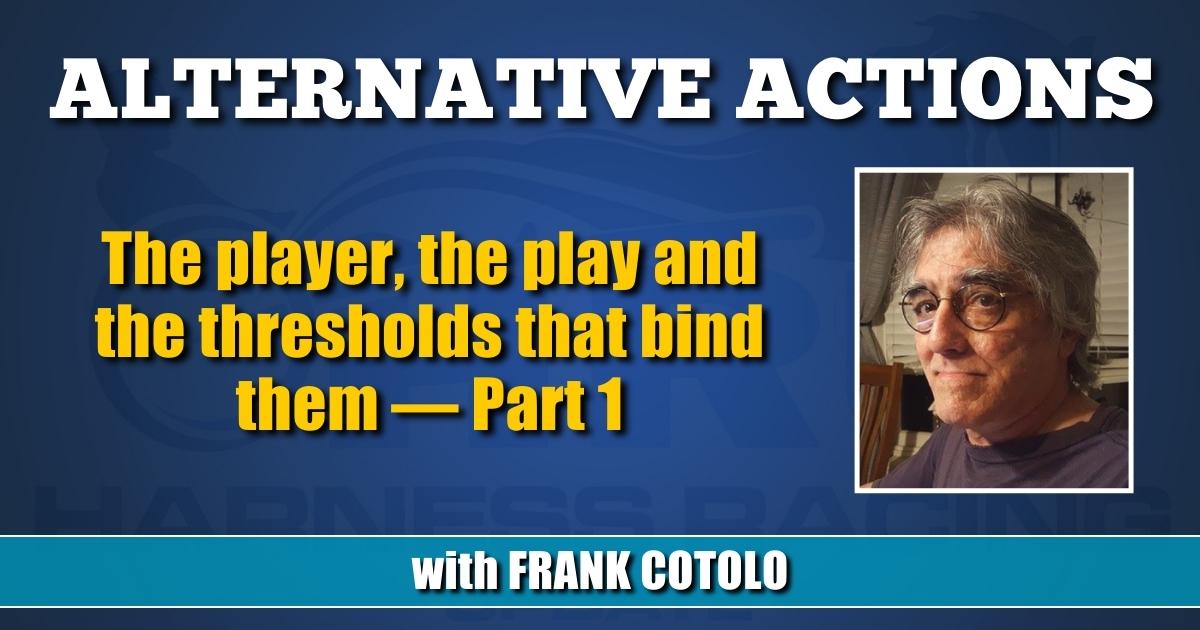The player, the play and the thresholds that bind them — Part 1
by Frank Cotolo
I am not one for New Year’s resolutions. However, come every calendar year since I became my own breadwinner, I settle accounts with the previous 12 months of spending and earning and, of course, taxes and I start a fresh personal-and-business budget ledger.
The closest thing I imagine that to a resolution is my conscious aim to earn more in the new year than in the past year as an independent contractor. No definitive means come to mind but I trust it will as long as I stay aware I am not satisfied with my previous year’s income.
There were years when I did not have to work harder to earn more because of some windfall project but being aware of wanting to earn more allowed me to take stronger considerations about accepting or rejecting projects. It is necessary for me to balance a work load because adding new work may affect the core work and extra money earned is not worth putting steady projects in jeopardy.
Back in the ‘80s when I was playing pari-mutuels daily or nightly while sharing work hours with writing projects, there were times when one project negatively affected another and that stained the quality of my work. I swore (though not a resolution) I had to assign priorities to projects no matter how much extra I was offered in a particular year.
One season, my pari-mutuel bankroll was in the process of producing the highest rate of investment (ROI) in my betting career and I decided to up the ante by increasing my wagers — without changing the tried-and-true methods of my wagering plan. It was advice given to me by an excellent money-manager from whom I learned about distinguishing the act of betting from the act of handicapping.
It was time to take the next step, one which would not interfere with my other streams of income. I chose to increase my wagering significantly.
“The racetrack will be happy,” I told my money-manager.
“One thing you must remember, though,” he said.
“Which is what?”
“You can still lose.”
“I know that.”
“A lot more than usual,” he said, “and if it gets out of hand you could lose your whole bankroll. And the racetrack won’t like that one bit.”
My money-manager suggested an increase should be far less than I intended while still capping any wager to no more than five per cent of my bankroll. I argued but gave in.
My “money handler” — the pari-mutuel raceway — would still be happy because a steady financial plan kept me gambling, which helped keep the raceway in business.
It was not until the end of that season when the tale of another bettor on the grounds ended badly on his part and the raceway. The situation made me understand how betting thresholds affect the player and the track where he or she plays.
The Delaney Conundrum
A Los Angeles show business newspaper ran a story about a successful writer of television programs who spent much of his time that season at a local raceway (for privacy’s sake, we call the writer Delaney and the racetrack Palmtree Park).
Most of us Hollywood in show business knew about Delaney’s career; it was strewn with success, including super hit shows of the era. Delaney won Emmys and broke the record for earnings by a novice author when in one season he earned about $11 million. His lifestyle was in direct proportion to making that kind of money (which was worth much more in the ‘80s than it is now).
At Palmtree Park, Delaney’s friends said he was serious about betting and was an exceptional handicapper. In past seasons he made a decent ROI. Then, one season during the height of his success he experienced, as do all bettors sometime or other, an unprecedented losing streak. With no sound financial plan for wagering but plenty of personal cash to bet, Delaney faced the streak with nothing less than reckless abandon.
A friend witnessed the daily, grinding Delaney defeat. “He would begin to bet, lose, and be unable to stop betting. He was crazy, betting [and losing] thousands of dollars in every race.”
Palmtree Park loved him, however, because he was a “churn engine,” packing the pools of ordinary races with scads of dough. One official at the track called Delaney the “Tycoon of Takeout.”
No one figured there was a bottom to the pocket of a man who drew an enormous salary from making television shows. In Part 2 we finish Delaney’s tale and write more about the strained relationship of a raceway and its clients.

















